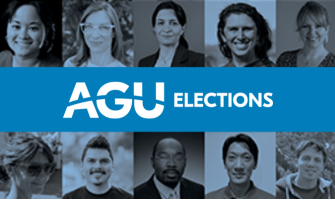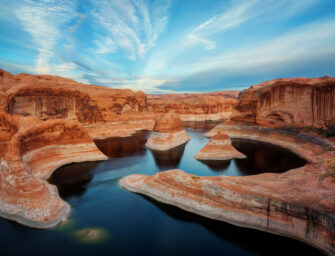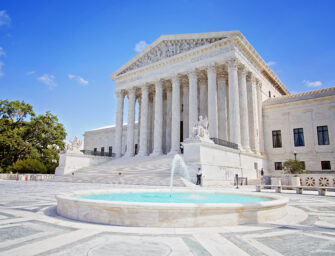The President-elect’s Welcome
— By Robin Bell, President-elect, AGU
I am honored to have been elected to serve as AGU’s president-elect in what is emerging as a challenging time for science. It is my hope that by working together through AGU we will meet this challenge and emerge stronger having conveyed a broader understanding of the importance and relevance of earth and space science to people everywhere.
I decided to become a geophysicist just after I graduated from high school when I learned it was possible to use physics to decode how the earth worked. While I started my career studying gravity and tectonics, I shifted to the study of large ice sheets, as these continental scale pieces of ice impact people around the globe. My work has been richly interdisciplinary as ice sheets cover many things: my favorites are subglacial volcanos, hidden ancient mountains ranges, subglacial lakes and fluvial systems. How these features develop and change are important for ice sheet stability.
The Lamont-Doherty Earth Observatory of Columbia University has been my science home for 35 years. It is a great place to do science and New York offered many opportunities for a two career couple. I have been very lucky to be married to Karl Coplan who has been my hero, rearing our children while I chased science from pole to pole. Karl and I love being in the open ocean and together sailed across the Atlantic with our children. It was so much fun we did it again.
Science is my passion. It is a good day when I learn something new. It is even more fun when I am in the room when something new is discovered. One of my favorite AGU moments was watching two young scientists give back-to-back talks and observing the moment when they realized that their two papers, taken together, revealed a new discovery. We are very lucky as a species to be able to have a global perspective on how our planet operates. And AGU is critical to making sure we communicate the beauty and wonder of our science, and that we attract the best young people to the field of earth and space science. I am keen that our field be open to all, and provide an unbiased and fair experience for all.
As a young scientist, AGU provided a place for me to share my science through meetings and publications. AGU also enabled me to build connections across the global science community that are so essential for science. I made the decision to become involved with AGU leadership as a way to give back to that community, and to ensure that AGU remains a vital organization that fosters the development of scientists of all career stages — enabling discoveries and empowering the next generation of leaders.
Given the changes in the political scene over the last several months in the United States and globally, it seems that this job will be much more dynamic than I thought when I agreed to run! While the administration in the US has many worried that our profession – as one that honors evidence and facts – will be under attack, this challenging time will also bring new opportunities. We have an opportunity to expand public understanding about how essential science is to our global society. It will be especially important to build stronger connections between scientists and the communities they live and work in. A critical challenge in the coming years will be to take steps to ensure that anti science rhetoric does not drive away or discourage prospective and young scientists.
While science and support for science appears to be under attack, AGU has several opportunities for enhanced engagement across the sciences and with the public, including, but not limited to the centennial, Sharing Science, and the Thriving Earth Exchange (TEX). I look forward to advancing these programs and to supporting and developing an enhanced meeting portfolio with AGU members, council, board and staff in the coming years.





Robin, Please acquaint yourself with the issue of AGU reducing the number of Congressional Science Fellows (CSFs) this year from two to one. CSFs serve as Legislative Assistants in the offices of a senator, representative, or congressional committee. AGU has a long history of CSFs with significant achievements, including federal legislation, funding for science, important testimony in hearings, and initiating government investigations. This is a particularly bad time for AGU to be reducing its commitment to public service. A large number of AGU members protested this unfortunate decision. Please ask to see their comments. I am the Chair of the Congressional Science Fellowship Program Task Force, and I would be happy to answer any questions you might have. Thank you.
Dear Jim,
First, I would like to thank you and the other alumnae for your continued passion and dedication to the Congressional Science Fellowship program. I agree that the CSF programs is an important program that has made significant contributions, which made the decision all the more difficult.
As Eric and I have written to you, AGU total revenues have been relatively flat over the past several years. Though we had to make tough budget decisions across all programs and services, we remain committed to the Congressional Science Fellowship program – albeit for only one Fellow this year, compared to two, while also maintaining a commitment to additional staffing in both public affairs and communications. These staff work on behalf of AGU members to advocate for our members and their science to Congress and the Administration. In addition, we continue to provide support and expand resources such a skill development and communication workshops through our Sharing Science program so we can steadily increase the number of AGU members who want to contribute at the science policy. This year more than ever grassroots voices are going to be critical in securing support for science within Congress. I am pleased to say that participation by AGU members in Sharing Science increased by 40% in 2016.
I want to reassure you that we exploring options to help us financially support more than one individual as Fellow in Congressional Science Fellowship, including new partners and funding sources. We would welcome your input in this process. We also hope that we can call upon your leadership to help engage more scientists in the policy process to ensure that our voice is being amplified and policymakers are informed about the value of science to our nation.
Thank you again for your continued dedication to AGU.
Chris
Robin, congratulations on your selection as AGU president. After leaving NSF polar programs in 2012, I lectured about the Antarctic for four seasons on a cruise ship. My favorite lecture was “Antarctic ice,” and my favorite q/a moment with passengers would be when a climate change denier would challenge me and, before I could open my mouth, other passengers would jump in and say something like, “Pay attention to what he just said!” Despite the politics, the ground swell is support for science-based reality. — Guy
Robin, congratulations on your election! AGU is certainly in good hands under Eric’s and your leadership for the next four years. All of us look forward to working with you to realize your vision of a public better informed about science and about our planet. Thank you for sharing the ways in which AGU has enabled your science. You remind us all what a privilege it is to be part of this community and how much AGU can do to help us. Margaret